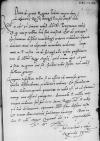Letter #2590
Bona Sforza to Ioannes DANTISCUSCracow (Kraków), 1542-09-22
| received Heilsberg (Lidzbark), 1542-09-30 Manuscript sources:
| ||||
Text & apparatus & commentary Plain text Text & commentary Text & apparatus
Reverendo in Christo Patri, domino
Reverende in Christo Pater, sincere nobis dilecte.
Pergratum nobis est, quod nos Paternitas Vestra litteris suis inviserit et de principum Christianorum discidiis tumultibusque certiores reddiderit. Faxit Dominus Deus, ut aliquando iucundiora audiamus. Cupimus a Paternitate Vestra, ut de his atque aliis rebus, potissimum vero de serenissimo
Bene valeat Paternitas Vestra.
Dat(ae) or Dat(um)⌈Dat(ae)Dat(ae) or Dat(um)⌉
Ad mandatum s(acrae) or s(erenissimae)⌈s(acrae)s(acrae) or s(erenissimae)⌉ maiestatis reginalis proprium
.

 BCz, 1601, p. 700
BCz, 1601, p. 700